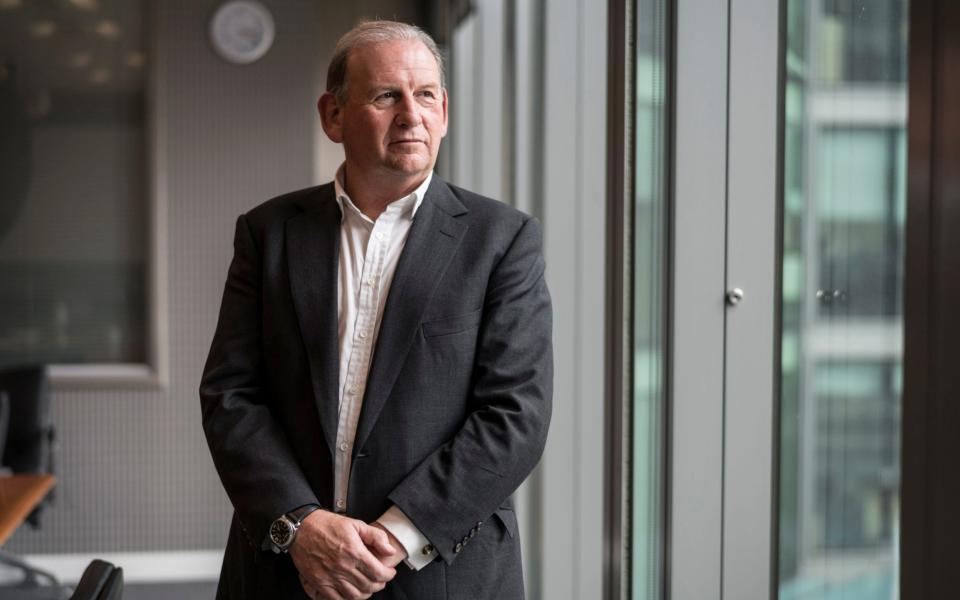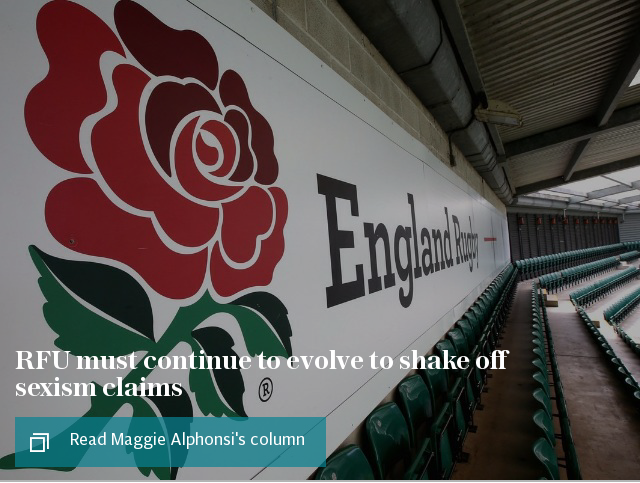Exclusive: RFU chief backs idea of a woman coaching England

The Rugby Football Union intends to create a coaching development pathway to enable a woman to become the England head coach, The Daily Telegraph can reveal.
It is understood to be among the initiatives being put in place to develop the elite end of the women’s game and address the RFU’s gender pay gap. The RFU is also aiming to increase the number of women in senior management roles as part of a long-term target for a 50-50 gender split.
The moves are part of the governing body’s bid to embrace diversity and inclusion after a Telegraph investigation revealed a culture of sexism persisted at Twickenham and in the wider game.
Andy Cosslett, the RFU chairman, said he was determined to create a culture where it was possible for a woman to one day take charge of the senior England men’s team. Asked if he believed it was a realistic goal, Cosslett said: “Why not? Someone would have to tell me why not before I would accept it.
“I can’t imagine why not. At one time, they said you can’t have female officials because they are not fit enough or they don’t like the language. Nonsense, absolute nonsense. You can’t have this, you can’t have that, they said.
“Well the women’s game is knocking down all these walls. They don’t need me. They are knocking these obstacles down on their own and with the demonstration of their power, their achievement, their ambition and their drive.
“All we need to do is to create the environment for it to succeed. So an England head coach who is female – bring it on.”
Appointing a woman to the England job would also have a massive impact on addressing the RFU’s gender pay gap.

The governing body announced in April there was a 23 per cent difference between the average hourly wages of men and women it employed. The RFU claimed this was largely due to a higher concentration of men in senior roles – in particular in elite rugby coaching and management.
The reporting period included Eddie Jones’ side winning a Six Nations Grand Slam, a 3-0 Test series victory against Australia and all of their autumn Tests.
That resulted in a number of performance bonuses being paid to men in senior coaching roles, contributing significantly to the 64 per cent gap in RFU bonus pay.
“To properly address the pay gap, we probably need to have a female head coach of the England senior team, but hey, why not? Cosslett added. “Who knows where things might go in the future? There is no restriction in my mind. None. Absolutely none.”
Cosslett said the RFU also wanted to increase the pool of talent of their female staff at Twickenham to address the pay gap.
“There is changing corporate governance rules probably coming down the line to the business world, which will end up in sport, where they are looking at having pipelines which are going to be equally female and men in terms of the senior management population,” Cosslett added. “Now, that is not in law yet but if that becomes part of the corporate governance guidelines in 2019 or 2020, that will have a marked effect on our entire society.
“The RFU if it is trying to be representative of the society we live in, that is where it needs to go.

“The number of people coming through into senior positions is the key because that is where the weighting comes. So, we need more senior executives who are female and to do that we need a bigger pool of talent and modern and flexible work practices so that they are able to have a family and work.”
Meanwhile, Women in Sport, an organisation to promote gender equality through and within sport, said the Telegraph investigation, which exposed an alarming prevalence of sexist attitudes and behaviour at the RFU, reflected the findings of a recently conducted survey of over 1,000 people working in the sport sector.
“The revelations about the RFU reinforce some of our findings, which we will be launching in full in June,” said a Women in Sport spokeswoman.
“We already know, from audits of women in leadership roles in sport that we have undertaken for the last seven years, that women are massively underrepresented at both the paid and voluntary leadership levels of sport.
“In 2016, for example, half of the national governing bodies of sport in England and Wales had less than 30 per cent women on the board.
“Our research helps us understand what is holding women back – and we found, in line with the RFU investigation, that it is aspects of tradition and culture that impede women’s progression.
“Forty per cent of the women in our survey said they felt less valued than men in the sport workplace. We found that women are far more likely than men to feel their performance is over-scrutinised and their influence and opinions are given less weight or ignored, because they are female.
“Women in Sport believes that it is these cultural problems in the sector which need to be addressed if meaningful lasting change is to be achieved. We will publish the full findings of our research into the culture of the sport workplace next month.”

 Yahoo Sport
Yahoo Sport 





































